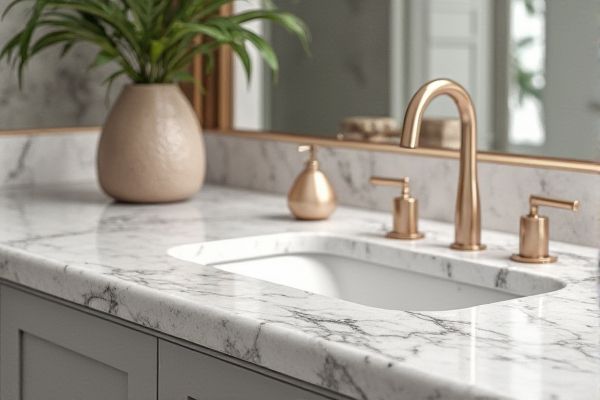
Quartz countertops offer superior durability and low maintenance compared to marble, which is more porous and prone to staining and scratching. Discover the key differences to choose the perfect surface that fits your style and lifestyle by reading the rest of the article.
Table of Comparison
| Feature | Quartz Countertop | Marble Countertop |
|---|---|---|
| Material | Engineered stone (natural quartz + resin) | Natural metamorphic rock |
| Durability | High resistance to scratches and stains | Prone to scratches and etching |
| Maintenance | Low maintenance, non-porous surface | Requires sealing and regular care |
| Appearance | Consistent pattern, wide color options | Unique veining, natural variations |
| Heat Resistance | Moderate heat resistance | Less heat resistant, prone to damage |
| Cost | Moderate to high | High to very high |
| Lifespan | 10-15 years average | 15-20 years average |
| Environmental Impact | Manufactured, may have resin chemicals | Natural stone, quarrying impact |
Introduction to Quartz and Marble Countertops
Quartz countertops offer engineered durability with a blend of natural quartz crystals and resins, providing stain-resistant, non-porous surfaces ideal for kitchens. Marble countertops, formed through metamorphic processes, exhibit unique veining and luxurious aesthetic appeal but require more maintenance due to their porous nature. Both materials serve distinct functional and design preferences, balancing beauty and practicality.
Composition and Material Differences
Quartz countertops are engineered surfaces composed of approximately 90-95% natural quartz crystals combined with resins and pigments, offering high durability and low porosity. Marble countertops are natural stone primarily made of crystalline calcium carbonate, prized for its unique veining and softer surface that requires more maintenance due to its susceptibility to staining and etching. Understanding these composition and material differences helps you choose a countertop that balances aesthetic appeal with practical performance for your space.
Appearance and Aesthetic Appeal
Quartz countertops offer a consistent, uniform appearance with a wide range of colors and patterns that can mimic natural stone, providing a modern and polished look. Marble countertops feature unique, veined patterns with rich, natural variations that add timeless elegance and luxurious charm to any space. Your choice depends on whether you prefer the flawless finish of quartz or the classic, distinguished beauty of marble for your kitchen or bathroom design.
Durability and Longevity
Quartz countertops offer superior durability and resistance to scratches, stains, and heat compared to marble, making them ideal for high-traffic kitchens. Marble, while elegant and timeless, is softer and more porous, requiring regular sealing to prevent etching and damage over time. Choosing quartz ensures your countertop maintains its appearance and functionality for years with minimal maintenance.
Maintenance and Cleaning Requirements
Quartz countertops offer low maintenance with non-porous surfaces that resist staining and bacteria, requiring only mild soap and water for cleaning. Marble countertops are porous and susceptible to staining and etching, necessitating regular sealing and gentle, pH-neutral cleaners to preserve their appearance. Frequent maintenance for marble ensures longevity, while quartz demands minimal effort for daily upkeep.
Cost Comparison: Quartz vs Marble
Quartz countertops typically cost between $50 and $150 per square foot, making them more budget-friendly compared to marble, which ranges from $75 to $250 per square foot. The price variation in marble depends on the type and rarity of the stone, often leading to higher installation and maintenance expenses. Choosing quartz can be a cost-effective option for Your kitchen upgrade while still offering durability and aesthetic appeal.
Stain and Heat Resistance
Quartz countertops offer superior stain resistance due to their non-porous surface, making them less prone to absorbing spills compared to marble. Marble countertops, while heat resistant to a certain extent, can be vulnerable to staining and etching from acidic substances and prolonged heat exposure. Choosing quartz ensures your kitchen surface maintains its appearance with minimal maintenance against stains and heat damage.
Installation Process and Complexity
Quartz countertops require a precise fabrication process involving computer-aided design and cutting, ensuring a custom fit with minimal on-site adjustments, whereas marble countertops demand careful handling due to their natural veining and brittleness, often increasing installation time and complexity. Quartz installation benefits from factory-polished edges and a uniform slab, allowing for straightforward seams and easier maintenance during placement. Marble's porous nature necessitates sealing before and after installation to protect against stains, adding steps that complicate the overall installation process compared to engineered quartz surfaces.
Environmental Impact and Sustainability
Quartz countertops offer greater environmental sustainability than marble due to their engineered composition, which often incorporates recycled materials and requires less quarrying. Marble extraction and processing generate significant carbon emissions and large amounts of natural resource depletion, making it less eco-friendly. Your choice of quartz supports reduced environmental impact through energy-efficient manufacturing and longer-lasting durability.
Pros and Cons Summary
Quartz countertops offer superior durability, stain resistance, and low maintenance, making them ideal for high-traffic kitchens. Marble countertops provide a timeless, elegant aesthetic with unique veining but are prone to staining, scratching, and require regular sealing. While quartz offers consistent color and pattern, marble's natural variations appeal to those seeking a classic, luxurious look despite higher upkeep.
 homyna.com
homyna.com